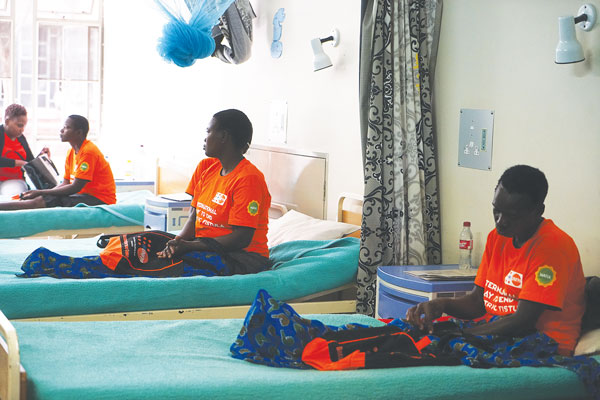
The place is located in a remote, hot, dry, rugged terrain, with gravel roads connecting the few sparsely located health centres.
BY STEPHEN TSOROTI

In this Zambezi Valley basin, Violet Simamba, a Tonga woman in her early 30s, has been fighting the odds with her bowls and urine, leaking uncontrollably, as she is afflicted with a condition known as obstetric fistula.
Although Simamba had always dreamt of becoming a proud mother, tragedy struck, as she gave birth at 17.
It has been 16 years now, and she has lived a nightmare since that time, ostracised, abandoned by her husband , scoffed by other women of her community, and worse, had little hope of ever carrying her own child. Simamba’s ordeal is far from unusual in Zimbabwe.
Gladys Chinyama from Chiredzi, shares the same horror story. For 35 years, she suffered in silence until she learnt of the fistula repairs from a radio programme.
As they chat at bedsides awaiting their turn for corrective surgery at Chinhoyi Provincial Hospital, hope is rekindled.
According to medical experts, obstetric fistula is an injury that usually occurs during child birth, creating a hole between the birth canal and the bladder or rectum.
- Chamisa under fire over US$120K donation
- Mavhunga puts DeMbare into Chibuku quarterfinals
- Pension funds bet on Cabora Bassa oilfields
- Councils defy govt fire tender directive
Keep Reading
It is caused by prolonged, obstructed, labour without timely access to emergency obstetric care, notably a caesarean section.
The injury leaves the woman leaking urine, solid waste or both, exposing them to a host of other medical problems over time.
Sufferers also endure depression and social isolation, as people often avoid them or feel uncomfortable in their presence because of the smell associated with the condition.
“It is a condition that is becoming a leading cause of death and disability among women of reproductive age,” Bernard Madzima, the director of family health in the Health and Child Care ministry, said.
“At least eight women and girls die every day in Zimbabwe due to pregnancy-related causes another 20 to 50 suffer severe morbidities such as fistula.”
Through a programme, the Women and Health Alliance (Waha), in association with the United Nations Fund for Population Activities (UNFPA) have been giving free corrective surgery.
The programme has been so successful and plans are afoot to establish other surgery camps in the country.
In May 2015, with support from UNFPA, the Health ministry decided to replicate the programme in Zimbabwe after witnessing it during a fact-finding mission to Ethiopia, resulting in the launch of the obstetric fistula reconstruction centre.
“To date, a total of five fistula repair camps have been conducted and more than 300 women have benefitted from these operations, each surgical operation taking an average of four hours,” says Chinhoyi Hospital superintendent, Collet Mawire, who is also the only genealogist at the hospital.
“We are still constrained by lack of human resources and equipment. A lot needs to be done to clear the backlog.”
Pricilla Mabande, a co-ordinator with Waha, said the condition afflicts girls, who become pregnant, while still physically immature.
“Like many other countries in the region, Zimbabwe has been battling the scourge of child marriages and cultural norms that put women at risk, especially when they are pregnant.
“Obstetric fistula has already been eliminated in industrialised countries by the availability of treatment for prolonged and obstructed labour – typically caesarean sections, which I am convinced as a country we are doing well, but more needs to be done.”
Mabhande notes that efforts to address the underlying issues that fuel poverty, gender inequality, early child marriages and childbearing and lack of education are crucial.
Since August 2015, Waha’s technical assistance has provided support to Health ministry to implement the obstetric fistula programme by providing client hygiene kits for women in camp, hospital administration fees for clients during repair camp, allowances for the local doctors training in pre and post operative fistula management and drug and consumables for operating theatre for fistula.
UNFPA country representative in Zimbabwe, Cheikh Tidiane Cisse, believes that the reconstructive surgery can usually repair a fistula.
“Unfortunately, women, who are affected by this injury, often do not know about treatment, cannot afford it or cannot reach the facilities, where treatment is available. Counselling and other forms of support, such as job training, are necessary to help women re-integrate into their communities after they have been treated,” he says.
Cisse says prevention measures must include ensuring skilled attendance at all births and providing emergency obstetric care for women who develop complications during delivery.
The persistence of obstetric fistula in the country is a sign that health systems are failing to meet women’s essential needs.
Investment in maternity waiting homes that bring women closer to health facilities has been identified as key element in fighting the scourge. Pregnant women in most rural parts of Zimbabwe register late for antenatal care owing to sparsely located health centres, and in most cases they walk long distances to access health facilities.
This has prompted UNFPA to revitalise 120 maternity waiting homes to ensure that health services are accessible.
In 2003, UNFPA and its partners launched the global campaign to end obstetric fistula, which now works in more than 50 countries to prevent, treat fistula rehabilitate and empower survivors.
Over the 12 years UNFPA has globally, directly supported more 57 000 surgical repairs for women and girls.











